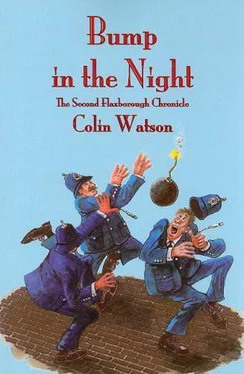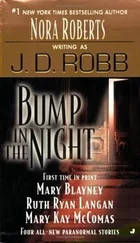“Belladonna tincture,” added Mrs Courtney-Snell. “And I’m not to worry if I cannot focus properly for an hour or two afterwards. The effect is disturbing but temporary. Isn’t that so?”
“But how right you are! I can see that a mere occulist cannot pull any—ah—wool over your eyes, madam!”
Mrs Courtney-Snell condescendingly chuckled and settled back to enjoy a nice, long eye test.
In St Luke’s Square the point duty policeman strode up to Biggadyke’s car and wrenched open the door. At the sight of the collapsed driver he swallowed his wrath and sent the handiest intelligent looking citizen to telephone for an ambulance.
Biggadyke recovered consciousness before it arrived. He moaned a little, and swore a great deal. The policeman, bending down to make him as comfortable as possible on the pavement, surreptitiously sniffed his breath. It was innocent of alcohol.
“Mind you,” he confided later to a colleague who had arrived to help, “it could have been drugs. Perhaps they’ll know at the hospital when they take a look at him. I wish it had been the booze, though, like it was last time. He’d not have got away with it again.”
The second policeman shook his head. “Don’t be too sure of that, either. Big’s got the luck of the devil. When they chucked out that case at the Assizes it was like giving a life-saving medal to a bloke who’d done in his granny.”
“One thing; he didn’t actually kill anyone this time,” said the point duty man, and he stepped into the roadway to disperse once again the clot of inquisitive onlookers that threatened to dam what traffic could still trickle past Biggadyke’s corrugated car.
He was not to know that killing was the theme of some frank observations being made at that moment by Biggadyke himself as he lay in a small private ward of Chalmsbury General Hospital.
“There’s a certain little gentleman in this town, duckie,” he informed the plain young nurse whose cold fingers explored his wrist, “who’ll be coming in here soon after I leave. But, by God, you’ll have your work cut out to find his bloody pulse!”
The nurse frowned slightly and transferred her gaze from her watch to a corner of the ceiling. Her lips made tiny counting movements. Then she replaced Biggadyke’s hand on the sheet with the air of a shopper rejecting a fly-blown joint. After stooping to write on the chart clipped to the foot of the bed, she stepped to the door.
“When are you coming back to keep me warm, nurse?” Biggadyke, even in distress, was sensitive to a situation’s demands upon his virility.
The girl paused in the doorway, turned, and spoke for the first time since his arrival. “Please ring the bell if you wish to move your bowels.”
Chapter Two
The news of Stanley Biggadyke’s accident was borne to the Chalmsbury Chronicle office in Watergate Street by the commissionaire of the Rialto, Mr Walter Grope, in hope of some reciprocal favour, such as the publication of his Ode to St Luke’s Church .
Mr Grope had a large, harmless face like a feather bolster. So loose and widely dispersed were his features that he had difficulty in mustering them to bear witness to whatever emotion happened to possess him. His expression either was spread very thinly, like an inadequate scraping of butter over a huge teacake, or else clung in a piece to one spot.
When he smiled, which he did seldom and with reluctance, the smile wriggled painfully from the corner of his mouth, crawled a short way into the pale expanse of jowl, and there died. His frown, though more readily produced—for Mr Grope found life sad and perplexing—did not trespass beyond the very centre of his forehead. When he was surprised, his eyebrows arched like old and emaciated cats.
So long as none of these extremes seized him, his face registered blank bewilderment. He had only to stand for a moment by the kerb for some kindly woman to take his arm and try to escort him over the road. When he entered a shop he would be assumed immediately to be the seeker of a lost umbrella and assistants would shake their heads at him before he could utter a word.
Yet in spite of his appearance Mr Grope had one remarkable gift: the ability to rhyme at a tremendous rate. He practised by mentally adding complementary lines to the remarks he overheard while marshalling patrons into his cinema.
Thus: “It’s raining cats and dogs outside” ( So spake brave Marmion e’er he died ) or “Did you remember the toffees, dear?” ( Quoth Lancelot to Guinevere ) or “I liked that bit where Franchot Tone...” ( Ruptured himself and made great moan ).
This happy facility as a versifier enabled Grope to supplement the pittance he received from his employers. The arty-crafty trade, which flourished exceedingly in Chalmsbury, found him a great asset to poker-work production. Matchbox stands, trays for ladies’ combings, egg-timer brackets—these bore such masterpieces of Mr Grope’s as his Ode to the River Chal as It Passes Between the Watercress Beds and the Mighty Oil-seed Mill . To save the poker from growing cold too often the title had been condensed to Ode and only the first verse quoted:
The river winds and winds and winds
Through scenery of many kinds.
It passes townships and societies,
And cattle breeds of all varieties;
But even the river must surely stand still
To admire our fine cress and Henderson’s Mill!
Upon smaller articles such as stud boxes, napkin rings and egg cosy identity discs appeared neat and edifying little slogans of Mr Grope’s devising: No Knife Cuts Like a Sharp Word and Mother—Home’s Treasure and Remember Someone May Want to Use This After You .
This being Wednesday and his morning free from supervising the Rialto’s charwomen, Grope had walked abroad to contemplate man’s inhumanity to man and to think up rhymes afresh. Having witnessed the collision in St Luke’s Square and waited to see Biggadyke loaded into the ambulance he had retraced his steps as far as the cinema and crossed to the Chronicle office almost directly opposite.
Josiah Kebble, the paper’s spherical editor, looked up from his desk on hearing Grope enter through the swing door. Between Kebble and his readers there was no other barrier. He considered the sociability of this arrangement well worth the occasional inconvenience of an outraged complainant bursting in upon him and demanding what he had meant by something or other.
“There’s been an accident,” announced Grope.
“Has there now?” said Kebble. “That’s nice.” He regarded Grope with amiable expectation and rolled a pencil between his palms. This produced a rhythmic clicking as the pencil struck against a thick, old-fashioned signet ring.
“That Biggadyke man has just driven into a lorry over in the Square. He’s not dead, though.”
“Stan Biggadyke, you mean? The haulage bloke?”
Grope nodded ruminatively. He thought coke...soak...bespoke ...
“Harry!” the editor called. A flimsy door opened in a cubicle-like contraption in one corner of the room and a pale, startled face was thrust forth. “Can you spare a minute, old chap?” Kebble inquired of it, then, neither receiving nor seeming to expect an answer, he added: “Just nip down to the Square. There’s been a smash.”
The face disappeared and a moment later Harry slouched sadly through the office and out into the street, listing beneath the burden of a camera the size of a meat safe.
“Can’t say I’m surprised, mind,” said Kebble. He glanced at the clock, “I don’t know, though. They’re hardly open yet.”
Grope, who had subsided thankfully into a chair, shook his head slowly. “It would have been a judgment,” he said, “if he’d been taken. But his sort stays on, you know. I often wonder about it.”
Читать дальше












